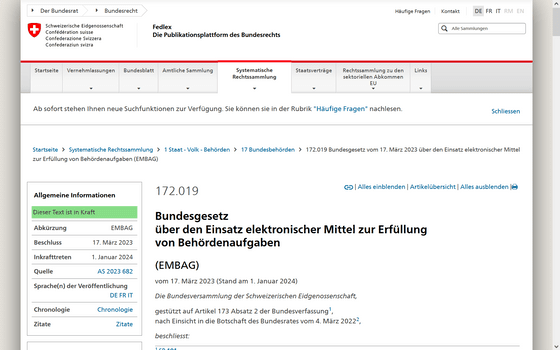Switzerland requires government agencies to open source all software they create for the government.

Switzerland has enacted the Federal Act on the Use of Electronic Means for the Performance of Government Tasks (EMBAG), which establishes mandatory requirements for open source software in government agencies. By promoting the use of open source software, it is expected that government operations will become more transparent, secure, and efficient.
SR 172.019 - Bundesgesetz vom 17. März 2023 über... | Fedlex

Bundesgesetz über den Einsatz elektronischer Mittel zur Erfüllung von Behördenaufgaben (EMBAG): in Schlussabstimmung angenommen – datenrecht.ch – das Datenrechts-Team von Walder Wyss
«Open by default» als Gesetz | ti&m
https://www.ti8m.com/de/blog/open-source-gesetz-schweiz
New Open Source law in Switzerland | Joinup
https://joinup.ec.europa.eu/collection/open-source-observatory-osor/news/new-open-source-law-switzerland
The EMBAG Act stipulates that all government agencies must disclose the source code of software developed by them, unless third-party rights or security concerns prevent it. In addition to mandating disclosure of source code, it also allows public agencies to provide additional services related to IT security, etc. This provision is said to enable the government to foster open source software while maintaining competitive balance and avoiding market distortions.
Discussions about releasing open source software have been going on since 2011. In 2011, the Swiss Federal Court released its court document management application, OpenJustitia, under an open source software license to allow other courts to use judicial software for free, thus saving taxpayers money.
However, Weblaw, a company developing a similar system, protested , arguing that if government agencies developed their products under open source software licenses, private companies could lose out in bids and lose out on competitive opportunities.

The next few years saw fierce debate, ranging from potential intellectual property issues to concerns about reduced security, and ultimately, due to lobbying efforts by the Parliamentary Group for Digital Sustainability and advances in open source development within the IT industry, the legislation was passed to not only allow but require government agencies to develop open source software.
In addition to software, Article 10 of EMBAG stipulates that federal data must also be made public by default in future. This type of data includes data acquired or generated by government agencies in the course of fulfilling their statutory duties, but does not include personal data or data protected by confidentiality obligations, etc.

Matthias Sturmer, president of CH Open, the open source advocacy group that promoted the law, said: 'The new law represents a huge opportunity for governments, the IT industry and society: the public sector will have less vendor lock-in , companies will be able to grow digital business solutions and taxpayers will spend less on IT solutions and be better served by increased competition and innovation.'
Related Posts:
in Software, Posted by log1p_kr







